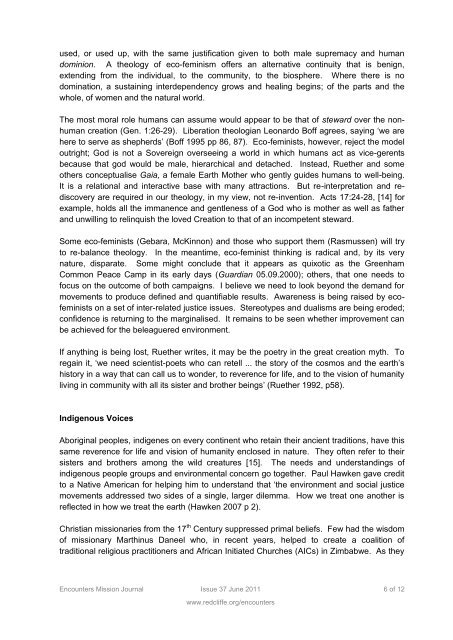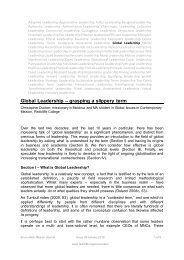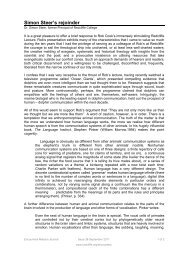The Contribution of Eco-feminism and ... - Redcliffe College
The Contribution of Eco-feminism and ... - Redcliffe College
The Contribution of Eco-feminism and ... - Redcliffe College
Create successful ePaper yourself
Turn your PDF publications into a flip-book with our unique Google optimized e-Paper software.
used, or used up, with the same justification given to both male supremacy <strong>and</strong> human<br />
dominion. A theology <strong>of</strong> eco-<strong>feminism</strong> <strong>of</strong>fers an alternative continuity that is benign,<br />
extending from the individual, to the community, to the biosphere. Where there is no<br />
domination, a sustaining interdependency grows <strong>and</strong> healing begins; <strong>of</strong> the parts <strong>and</strong> the<br />
whole, <strong>of</strong> women <strong>and</strong> the natural world.<br />
<strong>The</strong> most moral role humans can assume would appear to be that <strong>of</strong> steward over the nonhuman<br />
creation (Gen. 1:26-29). Liberation theologian Leonardo B<strong>of</strong>f agrees, saying ‘we are<br />
here to serve as shepherds’ (B<strong>of</strong>f 1995 pp 86, 87). <strong>Eco</strong>-feminists, however, reject the model<br />
outright; God is not a Sovereign overseeing a world in which humans act as vice-gerents<br />
because that god would be male, hierarchical <strong>and</strong> detached. Instead, Ruether <strong>and</strong> some<br />
others conceptualise Gaia, a female Earth Mother who gently guides humans to well-being.<br />
It is a relational <strong>and</strong> interactive base with many attractions. But re-interpretation <strong>and</strong> rediscovery<br />
are required in our theology, in my view, not re-invention. Acts 17:24-28, [14] for<br />
example, holds all the immanence <strong>and</strong> gentleness <strong>of</strong> a God who is mother as well as father<br />
<strong>and</strong> unwilling to relinquish the loved Creation to that <strong>of</strong> an incompetent steward.<br />
Some eco-feminists (Gebara, McKinnon) <strong>and</strong> those who support them (Rasmussen) will try<br />
to re-balance theology. In the meantime, eco-feminist thinking is radical <strong>and</strong>, by its very<br />
nature, disparate. Some might conclude that it appears as quixotic as the Greenham<br />
Common Peace Camp in its early days (Guardian 05.09.2000); others, that one needs to<br />
focus on the outcome <strong>of</strong> both campaigns. I believe we need to look beyond the dem<strong>and</strong> for<br />
movements to produce defined <strong>and</strong> quantifiable results. Awareness is being raised by ec<strong>of</strong>eminists<br />
on a set <strong>of</strong> inter-related justice issues. Stereotypes <strong>and</strong> dualisms are being eroded;<br />
confidence is returning to the marginalised. It remains to be seen whether improvement can<br />
be achieved for the beleaguered environment.<br />
If anything is being lost, Ruether writes, it may be the poetry in the great creation myth. To<br />
regain it, ‘we need scientist-poets who can retell ... the story <strong>of</strong> the cosmos <strong>and</strong> the earth’s<br />
history in a way that can call us to wonder, to reverence for life, <strong>and</strong> to the vision <strong>of</strong> humanity<br />
living in community with all its sister <strong>and</strong> brother beings’ (Ruether 1992, p58).<br />
Indigenous Voices<br />
Aboriginal peoples, indigenes on every continent who retain their ancient traditions, have this<br />
same reverence for life <strong>and</strong> vision <strong>of</strong> humanity enclosed in nature. <strong>The</strong>y <strong>of</strong>ten refer to their<br />
sisters <strong>and</strong> brothers among the wild creatures [15]. <strong>The</strong> needs <strong>and</strong> underst<strong>and</strong>ings <strong>of</strong><br />
indigenous people groups <strong>and</strong> environmental concern go together. Paul Hawken gave credit<br />
to a Native American for helping him to underst<strong>and</strong> that ‘the environment <strong>and</strong> social justice<br />
movements addressed two sides <strong>of</strong> a single, larger dilemma. How we treat one another is<br />
reflected in how we treat the earth (Hawken 2007 p 2).<br />
Christian missionaries from the 17 th Century suppressed primal beliefs. Few had the wisdom<br />
<strong>of</strong> missionary Marthinus Daneel who, in recent years, helped to create a coalition <strong>of</strong><br />
traditional religious practitioners <strong>and</strong> African Initiated Churches (AICs) in Zimbabwe. As they<br />
Encounters Mission Journal Issue 37 June 2011 6 <strong>of</strong> 12<br />
www.redcliffe.org/encounters




